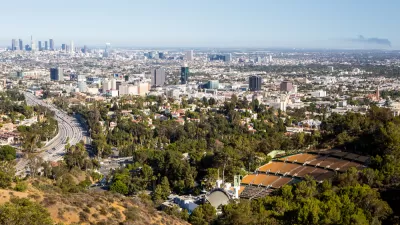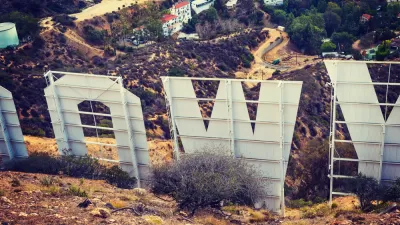Despite years of community engagement, political discussion, and planning, the city of Los Angeles has struggled to pass updated community plans, and in many neighborhoods, developments may suffer through years of litigation and bureaucracy.
The Westside Urban Forum, a networking organization dedicated to the land-use dialogue impacting Los Angeles’ Westside, hosted a May panel, “The Art of Getting to Maybe: Why has Updating LA’s Community Plans become Impossible?” examining the failure of the Hollywood Community Plan. Despite years of community engagement, the plan was challenged by community groups, thrown out by a judge, and repealed by the Los Angeles City Council in compliance with a court order. Moderated by Michael Woo, Dean of the College of Environmental Design, Cal Poly Pomona and former Los Angeles City Councilmember representing Hollywood, the panelists—Jane Usher, former Senior Assistant City Attorney and Planning Commission President; Dale Goldsmith, Partner, Armbruster, Goldsmith & Delvac; and Tom Donovan, West Los Angeles Area Planning Commissioner and Attorney—answer the “Why” question, citing a lack of political will behind community plans and the uniqueness of Hollywood.
Los Angeles' Community Plans are supposed to be updated on a regulate basis. The lack of support behind planning at the City Council and in neighborhoods, however, can severely slow down the process. With the Hollywood Community Plan now void, planners and developers must rely on the 1988 plan and the Los Angeles City Council for direction and approval.
The Planning Report shares the following excerpts from the Forum, focusing on how things operated in City Hall and whether Angelenos believe in real planning. Panelists agree that the scale of the geographic and social diversity of Los Angeles makes uniting constituents behind a common vision particularly challenging for City Councilmembers and officials. As Dale Goldsmith notes: "It is certainly a question of political will. If the city council was really focused on getting the plans up to date, I think you’d see a lot more progress. But keep in mind that Los Angeles is a vast city. Mike, when you were a city councilmember you had more constituents than a Senator in Wyoming. And you have huge geographic variation, even with some of the 35 community plans. Hollywood, for example, has hillsides, dense urban areas, and ethnic neighborhoods—I think that makes the planning process a lot more difficult. I agree with your professor that LA is different and harder because of the scale. Size does matter in planning."
FULL STORY: Mike Woo Moderates WUF Panel: The Impossibility of Updating City of LA’s Community Plans

Study: Maui’s Plan to Convert Vacation Rentals to Long-Term Housing Could Cause Nearly $1 Billion Economic Loss
The plan would reduce visitor accommodation by 25,% resulting in 1,900 jobs lost.

North Texas Transit Leaders Tout Benefits of TOD for Growing Region
At a summit focused on transit-oriented development, policymakers discussed how North Texas’ expanded light rail system can serve as a tool for economic growth.

Using Old Oil and Gas Wells for Green Energy Storage
Penn State researchers have found that repurposing abandoned oil and gas wells for geothermal-assisted compressed-air energy storage can boost efficiency, reduce environmental risks, and support clean energy and job transitions.

Private Donations Propel Early Restoration of Palisades Playground
Los Angeles has secured over $1.3 million in private funding to restore the Pacific Palisades playground months ahead of schedule, creating a modern, accessible space that supports community healing after recent wildfires.

From Blight to Benefit: Early Results From California’s Equitable Cleanup Program
The Equitable Community Revitalization Grant (ECRG) program is reshaping brownfield redevelopment by prioritizing projects in low-income and environmental justice communities, emphasizing equity, transparency, and community benefits.

Planting Relief: Tackling Las Vegas Heat One Tree at a Time
Nevada Plants, a Las Vegas-based nonprofit, is combating the city’s extreme urban heat by giving away trees to residents in underserved neighborhoods, promoting shade, sustainability, and community health.
Urban Design for Planners 1: Software Tools
This six-course series explores essential urban design concepts using open source software and equips planners with the tools they need to participate fully in the urban design process.
Planning for Universal Design
Learn the tools for implementing Universal Design in planning regulations.
Ascent Environmental
Borough of Carlisle
Institute for Housing and Urban Development Studies (IHS)
City of Grandview
Harvard GSD Executive Education
Toledo-Lucas County Plan Commissions
Salt Lake City
NYU Wagner Graduate School of Public Service





























